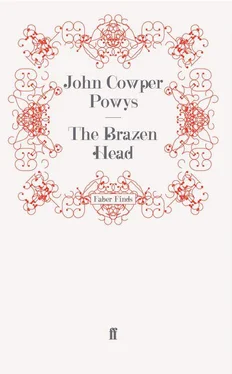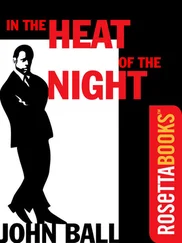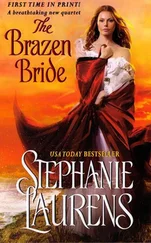“And the double-dyed idiot goes further even than that! Do you know, my lord, what I saw with my own eyes written on one of his carefully chosen parchment sheets? You would never guess! Nothing less than a passionate appeal to these teachers and to the young men who themselves want to become teachers, young men of good birth, like your own sons, to study Hebrew! Of course he’s perfectly right — you and I, my lord, don’t need a Grey Friar to tell us that —in indicating that the translations of Hebrew, all except that of the incomparable Jerome, are pretty rotten. But will these kids he’s catering for find the time, find the grammars, find the god-given or devil-given wit, to correct these treacherous and dangerous mistakes?
“How much better it would be for him, my Lord, if he would do what I do — that is to say leave all this theological business alone, and concentrate on experiment and invention; on experiment first, to find out what can be invented so as to be in harmony with Nature; and then, when we’ve got our invention , experiment again to find how far its use can go and yet remain in harmony with Nature.”
The perfectly abysmal self-satisfaction expressed at that moment in the unnaturally large face, under the alarmingly large forehead and beneath that huge crop of jet black hair, roused in the Baron of Roque more anger than he had felt for many a long year. But he succeeded in restraining himself from displaying anything but the alert interest of a polite host in the presence of a voluble guest for several seconds of expectant silence.
“Surely, O great Experimenter, surely, O great Inventor,” his alert pose seemed to say, as he leant forward from the round, hard, circular, gilded seat of his small upright armchair and clasped his fingers over his right knee, letting his foot thus balanced in the air sway interrogatively, “surely a man of your calibre didn’t allow a simple grey friar of the order we all know so well,” the Baron’s mute expectancy went on, “to reduce you to the position of a silent listener at a theological lecture?”
The invisible chronicler of all these events, which were of course both physical and psychical, cannot help noting how much more detached from any sort of egotism or self-assertion was this lord of the biggest Manor in Wessex than this plain soldier from Maricourt in Picardy.
The psychic difference between them displayed itself physically with nearly perfect propriety in the way the two men consciously or unconsciously managed their mouths. The red point of Master Peter’s tongue kept darting out from between his lips, just as if it were the instantaneously deadly sting of a human-headed Goblin armed with the poison of a hornet; while behind the lips of the Baron’s mouth some unspoken word seemed roaming about, testing and trying every surface of the walls of its prison-house, as if conscientiously seeking the entrance to a promised passage of escape, concerning whose existence, though it was supported by universal consent, he himself was rather doubtful.
The only light in what, throughout the whole Fortress, was known as “The Little Room” came from a large oil-lamp in which two wicks, each with its own particular flame, floated quietly, and by their light, on the thin sill of a small square window, looking out on nothing but darkness and square stone towers, a small gnat could be seen marching resolutely up and down.
The only heat in the little room — but this was quite sufficient to make it perfectly warm — came from a stately bronze receptacle containing red-hot coals, with which the Baron’s retainers kept it liberally supplied both by day and by night.
What Master Peter was thinking at that moment had certainly little to do with either theology or metaphysics.
“Would it be to my advantage or to my disadvantage,” he was asking himself, “to tell this patronizing English lord about the magnetic shock I gave to this fool of a friar? What’s against my doing so is the fact that I don’t yet know how long the shock I gave him actually lasted; indeed I don’t know yet whether it knocked the breath out of him forever! I rather hope it didn’t, because there is still that little point about the value of manganese as an ingredient in the making of an elixir, that I ought to ask him. God knows why I forgot.”
What the Baron was thinking was: “All these confounded quacks, whether they call themselves scientists or astrologists or alchemists or metaphysicians or inventors or theologians, are only plotting to get power for themselves over other people and glory for themselves over each other! What we must realize is that life goes on exactly the same whether we’re with them or without them! When Lord Edward comes home from these absurd crusades we shall all know better where we stand. These damnable Scots want to be hammered into quiescence by somebody who understands the art of war, not the art of changing metals.
“And for these Welsh thieves who keep invading this country, if once metal-changers and sorcerers really begin, as they seem to be beginning, to rule the world, it won’t be long before we shall be conquered by some ancient British robber who claims to be descended from Alexander the Great or Julius Caesar.
“But I know what I must do with this rogue — for it’s clear he’s some sort of oriental gipsy with the devil knows what games and tricks up his sleeve — is to get that fellow Spardo to take him round the ring of all the manors about here, even if he’s got to mount him on that unfortunate beast with a man’s head coming out of his neck! They told me out yonder that this fellow swears he comes from Picardy and that he likes to be called Maitre Pierre. Well! he can Maître-Pierre it to his heart’s content with old Spardo dancing round him, and with that horse — what’s its classic name? — to ride on! By God! that’s what I’ll do!”
At this point, in this curious dialogue between two silences, there suddenly opened one of those queer holes, or gaps, or gulfs, or chasms in the psychic-contact of two speechless persons who are watching each other like two animals, each wondering, in a sort of trance of expectation, not exactly whether it would be a good thing to leap at the other’s throat, but whether the power that moves the world, whatever that power may be, will decide on their battling or embracing; and in this hollow void it was brought home to the Lord of the Manor that this Master Peter in front of him was really and truly some kind of Medium.
For what did my lord hear, clearly and unmistakably, at that identical instant, but the familiar voice, carried up on the eddying wind from the darkened forest below, of Spardo himself addressing his weird horse and of Cheiron answering his owner’s voice with one of those indescribable sounds made by a self-conscious and self-possessed animal, a sound that had grown to have its quite definite meaning in the language of their mutual understanding.
“Come out with me for a moment, Master Peter of Maricourt, will you please? I want you to meet some very old friends of mine!”
The wanderer from Picardy followed him without hesitation or demur. When they reached the ground-floor the Baron hurried his guest through the anteroom and the entrance-hall, till he got him to the main entrance of the Fortress, and once there, with nothing but a humorous nod to the gate-keeper and the exchange of a more reserved and even a slightly enigmatic quip with the gate-keeper’s wife, he pushed open one of the big gates, and with a hand on Master Peter’s shoulder got him into the open, where by the light of a lantern hung on the branch of a tree they found Cheiron eating a supper of oats, and his master squatting on a fir-stump beside him devouring from a bowl on his knees some sort of steaming stew which the gate-keeper’s wife must have provided.
Читать дальше











